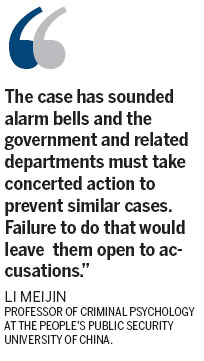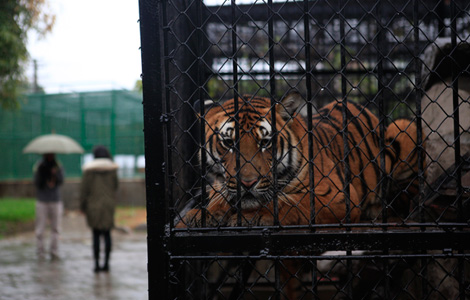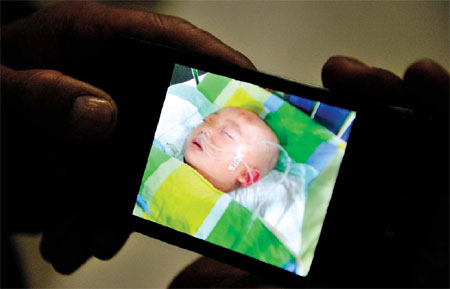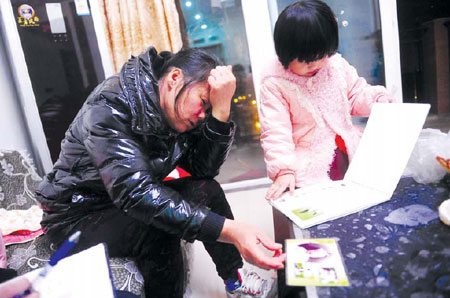Too young to be criminal
Updated: 2013-12-18 08:16
By He Na in Beijing and Zhang Chunyan in London (China Daily USA)
|
||||||||
Toddler beating case exposes legal dilemma in preventing juvenile crimes, report He Na in Beijing and Zhang Chunyan in London
A brutal and apparently motiveless attack that left a baby boy hospitalized with severe injuries has sparked public outrage across China. That outrage has been further stoked by news that police are unable to charge the assailant because she is younger than 14.
On Nov 25 in Chongqing, the girl, surnamed Li, attacked an unrelated toddler named Li Xinyuan after he became separated from his grandmother. She first assaulted the toddler in an elevator in the apartment block where they both lived, before taking him to her family's apartment where the attack continued.
When the elderly grandmother finally confronted the girl, Xinyuan was nowhere to be seen. When questioned, the girl claimed she had been playing with him on a 25th-floor balcony when he accidentally fell.
Xinyuan was later discovered on the ground outside the apartment block. He was covered in blood and had fractures to his skull and right eye socket. The boy is now being treated at a hospital where he will undergo surgery. He faces a long period of recovery.
The details of the incident are sketchy. Li calmly told the police that she took the boy to her home and "played with" - i.e. assaulted - him on the balcony, but didn't explain the reason for the attack or provide any further details.
Li's father told the media that his daughter has behaved normally since the attack and has shown no sign of remorse or emotional turbulence.
"In the face of such an attack, it's normal for the public to be angry and respond with a huge show of concern. The case has sounded alarm bells and the government and related departments must take concerted action to prevent similar cases. Failure to do that would leave them open to accusations that they condone this sort of behavior," said Li Meijin, a professor of criminal psychology at the People's Public Security University of China.
"The severity of the case means the families involved are unable to handle the attention, so the government and social organizations should intervene. If this attack were to be copied, no child would be safe," warned Li, who raised concerns about the way the police dealt with the case.
Age of responsibility
"When a case is serious enough to constitute a public menace, the police have an obligation to investigate and give the public an answer. But it's the court's job to judge whether the girl is too young to avoid criminal responsibility. We cannot fail to act simply because of her age," said Li.

She noted that similar cases have occurred in other countries, including Japan, the United Kingdom and the United States.
Although official statistics are unavailable, experts claim that China has seen a marked rise in juvenile delinquency since 1990, and that the number of cases involving assailants below the minimum age for criminal charges is rising. However, the question of how society should deal with "problem" children and prevent them from committing further crimes is one many countries face.
"I know that some countries have experienced cases of this type and we can learn from the way they handled them," said Li, recalling a trip she made to the UK in 2010 to study procedures for juvenile offenders.
"Britain has a special law that aims at intervention, not simply punishment, of minors. It clearly states the "punishment" for juvenile offenders between the ages of 7 and 18," she said.
Although cases in the UK are tried by a juvenile court, the sentence handed down doesn't punish the child. Instead the parents are compelled to attend government-funded "parenting classes" where they learn how to raise and educate their children correctly.
"Britain also has the Children Act. For children with a marked tendency to hurt others or display signs of abnormal behavior, community social workers formulate a 'safety correction and track plan', which usually lasts around three years," said Li.
Emotional attachments
A 2011 survey conducted by the People's Public Security University of China showed that the average age at which adolescents begin to commit crimes is 12.2 years. Before the age of 12, most children still display heavy psychological attachment to their families, especially their parents, so problems are usually confined within the family circle.
The rise of juvenile delinquency in China, especially in cases of cruelty, has resulted in a small number of legal professionals calling for the age of criminal responsibility to be lowered. However, most legal experts believe that the existing laws are sufficient.

The United Nations' Standard Minimum Rules for the Administration of Juvenile Justice clearly state that in legal systems that recognize the concept of a juvenile age of criminal responsibility, that age should not be set too low given children's emotional, mental and intellectual maturity.
The minimum age of criminal responsibility varies from country to country. In Switzerland it's 7, while in the UK it's 10. In Holland children are held to be responsible for their actions at age 12, while in France it's 13, and 14 in Germany.
In China, children under 14 are immune from the law, but for those with serious problems, the government can hire psychological assessment agencies to formulate a five to 10 year assessment and correction plan. At the end of that period, if the child is assessed as being normal in comparison with other children of the same age, the program is terminated.
Zhao Sanping, director of Beijing Guangheng Law Firm, who specializes in criminal cases, was shocked when he read about the case in Chongqing.
"I believe it's an isolated case. The age of criminal responsibility is based on the average intellectual level and mental maturity of children in each specific country. The law is there to protect the interests of the majority and can't be changed because of one or two isolated cases," he said.
"If the age of criminal responsibility is set too low or if there is no lower age limit at all, the notion of responsibility will become meaningless. The setting of the minimum age should emphasize the social compassion behind the law, and not punishment," he said.
Zhao explained that many foreign countries have very strong community networks and social workers play an important role in the correction of juvenile crime: "We have many communities in China, but the community networks are still underdeveloped. We simply cannot copy other countries' experiences."
The picture overseas
Closed circuit footage of Li attacking Xinyuan has gone viral on the Internet worldwide, raising concerns about China's image abroad. Some foreign observers have even compared Li with foreign teenagers who became notorious after killing other children.
In 1993, the UK was shocked by the murder of 2-year-old James Bulger, but even more appalled by the ages of his killers, Robert Thompson and Jon Venables, who were both 10. They were sentenced to eight years in prison.
"I think the only thing we can do is either lower the age of criminal responsibility or do away with it altogether, which is something I would favor. If you murder someone and plead insanity as a defense, it's up to the court to decide whether or not you knew what you were doing, because in cases such as this, English law is guided by rules going back about 400 years," said James Quarmby, a lawyer at the London-based international law firm Stephenson Harwood.
There's a huge difference between a child who attacks someone and pushes him off a balcony, and one who breaks a window. That alone should prompt a change in the law, he said, adding that the idea that all children are innocent angels and should be protected at all times is wrong.
"The court will decide whether or not the person can be tried. For juveniles, we should look at the nature of the child to see whether the act was preplanned or premediated," he said.
"The reason the Bulger case still has such resonance in the UK after 20 years is that it presented people involved in child protection with a dilemma, because it was a case of children inflicting violence on other children. The law should be changed and the idea that there should be a cutoff point is wrong. The age at which innocence ends is probably falling," he added.
Correction and education
In 2006, a 13-year-old boy from Heilongjiang Province raped a 14-year-old girl, but was never apprehended or punished. However, enraged that the girl's family had reported his crime, he harbored a grudge and later murdered the girl's mother.
"No punishment doesn't mean no intervention. China doesn't have any laws specifically for minors under 14. I am calling for a law to be drawn up, a Code of Behavior for Minors that would apply to children older than 7. Seeking to help, but not punish, the law would focus on intervention and the correction of behavior," said Li Meijin.
Zong Chunshan, director of the Beijing Legal and Psychological Counseling Service Center for Juveniles, said physical and mental immaturity mean the motives behind juvenile crime are often different from those that drive adults. Therefore, the correction and education of minors should be based on psychology, not punishment.
"On the contrary, excessive punishment will plant the seeds of revenge in their hearts and bring more harm to society. It's abnormal for a girl this young to commit such a cruel crime. She must have suffered a similar violent attack in the past. The girl should receive psychosocial counseling immediately and it should be carried out over the long term via observations, tests and intervention measures. The girl's father said his daughter was extremely calm after the case, which could indicate a highly developed antisocial personality disorder," Zong said.
"Chinese parents generally pay more attention to their children's material needs than their spiritual development. This case could teach all parents a lesson."
Contact the writers at hena@chinadaily.com.cn and zhangchunyan@chinadaily.com.cn
Wang Mingjie contributed to this story.
|
Xinyuan's grandfather displays a photo of the 18-month-old boy receiving treatment in the ICU. Li Jian / Xinhua |
|
Above: Xinyuan's grandmother and sister look at photos of the toddler. Right: Doctors performed brain surgery on Xinyuan on Monday, but the boy will have to remain in the hospital for the foreseeable future. Provided to China Daily |

(China Daily USA 12/18/2013 page7)

 Snow storm wallops NE USA
Snow storm wallops NE USA Russia to bail out Ukraine for $15 billion
Russia to bail out Ukraine for $15 billion
 Fatal tiger attack 'points to flaws in zoo management'
Fatal tiger attack 'points to flaws in zoo management'
 Merkel sworn in as chancellor for a third term
Merkel sworn in as chancellor for a third term
 Life in poetry
Life in poetry
 US first lady visits children in medical center
US first lady visits children in medical center
 Harvard reopens after bomb scare
Harvard reopens after bomb scare
 Snowstorms cause chaos for travelers in Yunnan
Snowstorms cause chaos for travelers in Yunnan
Most Viewed
Editor's Picks

|

|

|

|

|

|
Today's Top News
China, US communicate over warship encounter
Obama rated low on domestic issues
Vast deposits of 'flammable ice' found
Russia to bail out Ukraine for $15 billion
System for organ donors test
Luxury market cooling down
Court to issue guide on private loan cases
China, US urged to lead climate change fight
US Weekly

|

|









